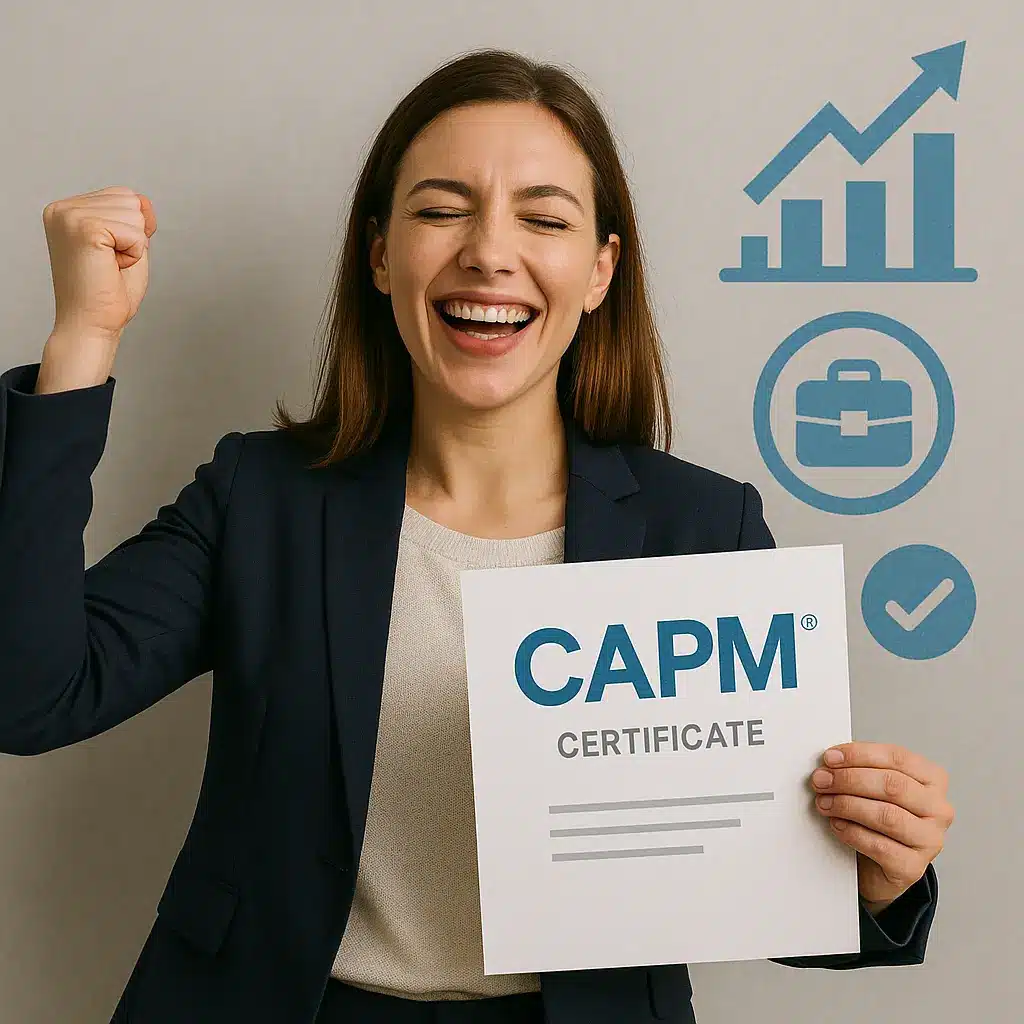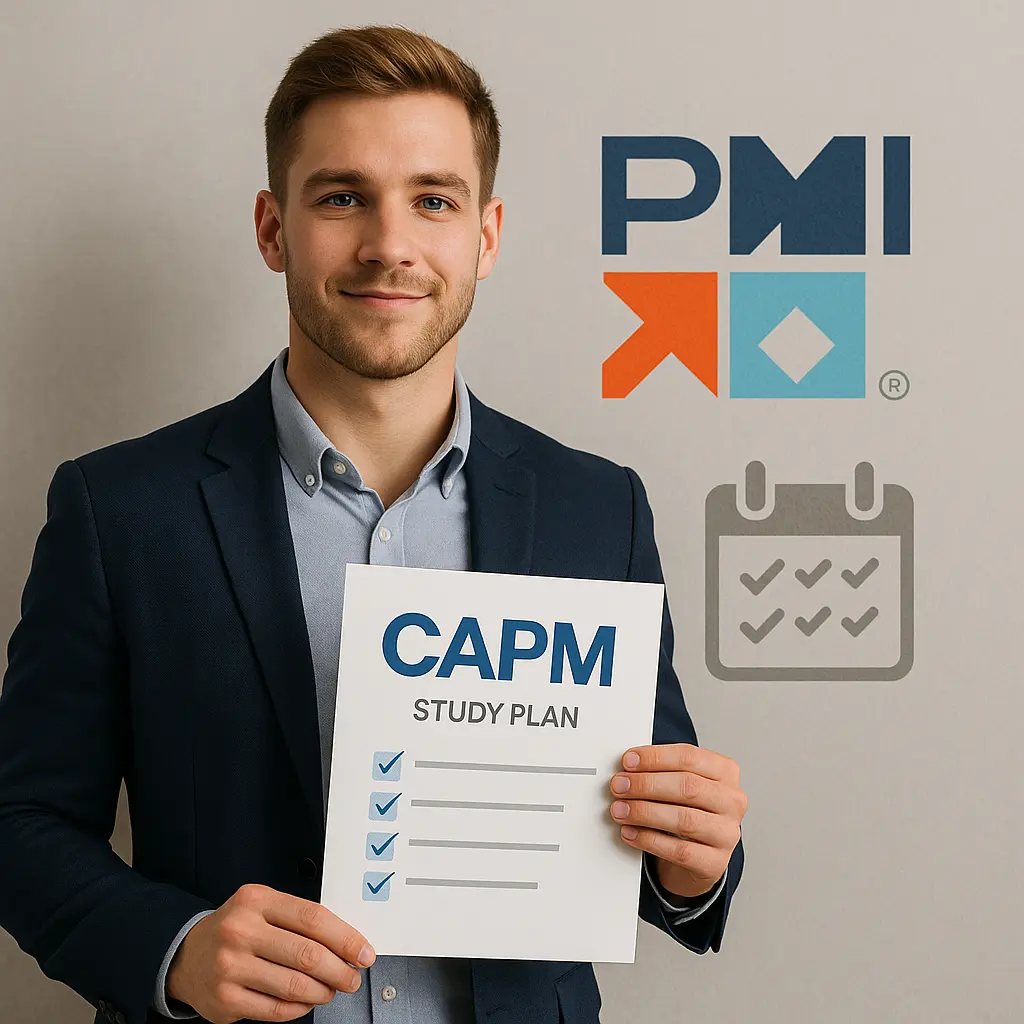10 Essential Topics Covered in CAPM® Training
By: Ryan Malaluan, CAPM®; Editor: Geram Lompon; Reviewed by: Alvin Villanueva, PMP®, PMI-ACP®
Starting a career in
With structured CAPM® training, you’ll complete the
Key Takeaways
- Gain in-depth knowledge of
project management concepts and frameworks - Strengthen your career path with a globally recognized
project management certification - Stand out among other professionals with a proven
project management foundation - Demonstrate commitment to
project management education - Unlock future roles in business, tech, healthcare, or project-driven budgets
1. The PMBOK® Guide and Its Knowledge Framework
The PMBOK® Guide (Project Management Body of Knowledge), published by the Project Management Institute (PMI®), is the cornerstone of CAPM training and exam preparation. It provides a structured framework of
This guide introduces 10 knowledge areas and five process groups that form the foundation of predictive
- Integration, Scope, Time, and Cost Management
- Quality, Resource, Communications, and Risk Management
- Procurement and Stakeholder Management
Each knowledge area connects to real-world project scenarios and is supported by key processes, inputs, tools, and outputs.
Learning these areas ensures you’re fluent in common
Pro Tip: Use diverse study materials, like flashcards, video lessons, and mock exams, to reinforce your understanding and prepare effectively at your own pace.
2. Prerequisites and Exam Structure for CAPM Exam Certification
To qualify for the CAPM certification exam, you’ll need to meet the following educational prerequisites:
- A secondary degree (such as a high school diploma, general educational development (GED), or associate degree)
- 23 contact hours of
project management education completed
These requirements ensure you have the foundational knowledge and learning background needed for CAPM-level concepts.
The exam features:
- 150 multiple-choice questions
- A 3-hour time limit
- Questions aligned with the PMBOK® Guide and core project management knowledge areas
Your CAPM preparation should focus on more than memorization. The exam tests how well you understand and apply common
Use structured study materials, such as online courses, prep books, or flashcards, and simulate real exam conditions to improve performance and build confidence.
Tracking your completion rate, learning terminology, and practicing under pressure are key steps for exam success. The more familiar you are with the format and pacing, the better equipped you’ll be on exam day.
3. Project Integration and Scope Management
In CAPM training, learning project integration and scope management is essential. These topics teach you how to define project goals, establish boundaries, and ensure that all components are aligned with organizational objectives. Effective integration ensures every activity contributes to the overall
You’ll develop the ability to:
- Create a detailed project charter and scope statement
- Coordinate essential elements such as timeline, budget, and quality standards
- Ensure that project managers organize tasks around clear business needs and constraints
Project integration management ties all project areas together, from initiation through closing, so nothing falls through the cracks. Meanwhile, scope management ensures the project includes all the work required, and only the work required, to meet the stated goals.
By building these skills, you’ll learn how to direct project teams, manage expectations, and reduce scope creep. These are critical abilities for any associate in
4. Time and Schedule Management
Effective time and schedule management is a cornerstone of successful
You’ll learn to:
- Break down work using Work Breakdown Structures (WBS)
- Apply tools like the Critical Path Method (CPM) and Program Evaluation and Review Technique (PERT)
- Implement resource leveling to balance team workload
- Use schedule compression to meet tight deadlines without sacrificing scope
These skills help you build realistic and efficient project timelines, mitigate delays, and adjust to unforeseen changes. They’re especially valuable in predictive
You’ll also explore how project managers organize time-sensitive tasks, estimate durations, and manage dependencies, skills that directly enhance your
Whether you’re working in tech, construction, or business, understanding time and schedule management will give you the structure and foresight to keep projects moving forward smoothly.
5. Cost Management and Budgeting
One of the most critical areas covered in CAPM training is how to plan, track, and control project costs. Whether you’re aiming for a role in operations, business analysis, or construction management, strong cost management skills are essential to success.
This part of the course teaches you to:
- Estimate resource and labor costs with accuracy
- Develop project-driven budgets and establish a cost baseline
- Monitor financial performance using Earned Value Management (EVM) and forecasting techniques
You’ll also learn how to allocate contingency reserves to manage risks and respond to financial variances effectively. These skills are especially useful in maintaining scope without overspending and ensuring financial accountability across all project phases.
By understanding project costs, you demonstrate the ability to deliver value, optimize resources, and support long-term project success. This competency enhances your credibility as a certified associate in
6. Quality and Risk Management
In CAPM training, you’ll explore how to maintain high standards while navigating uncertainty, two core responsibilities in any
You’ll learn to:
- Develop a quality management plan that ensures project deliverables meet stakeholder expectations
- Execute quality assurance processes and apply quality control tools
- Perform risk identification and both qualitative and quantitative risk analysis
- Create risk response plans and establish risk monitoring practices to adapt as the project evolves
Understanding risk management enables you to foresee potential issues before they escalate, while strong quality management ensures that your team consistently delivers value. These skills are essential for project professionals who aim to direct project teams with confidence and precision.
Understanding this area reinforces your ability to align with the
7. Communication and Stakeholder Management
In any
You’ll learn to:
- Develop clear communication strategies tailored to diverse audiences
- Identify stakeholder needs and manage expectations throughout the project lifecycle
- Use collaborative platforms and team tools for real-time updates, status reporting, and feedback loops
Good stakeholder management is more than just updates; it’s about building trust and alignment. Whether you’re presenting to executives or updating a team member on task changes, your communication approach can make or break project success.
This skillset helps you organize projects, resolve conflicts, and create a culture of collaboration. For associate project managers or certified associates, these practices are especially valuable in complex environments like healthcare, construction, or IT, where multiple stakeholders drive decision-making.
8. Team Leadership and Resource Coordination
Successful
You’ll explore how to:
- Lead project teams by setting clear expectations, motivating members, and fostering accountability
- Encourage collaboration, navigate personality dynamics, and effectively resolve conflicts
- Align resources, people, tools, and time with project goals and task priorities
This area highlights the importance of leadership as one of the common
You’ll also learn to monitor resource utilization, prevent overallocation, and adjust plans based on real-time performance. Whether you’re working toward a role as an associate in
9. Agile and Adaptive Project Management
In today’s fast-moving, innovation-driven industries, agile
You’ll explore:
- Core agile principles such as adaptability, customer focus, iterative progress, and team autonomy
- Popular agile methods like Scrum, Kanban, and Lean, and how to apply them effectively
- Ways to integrate agile techniques with predictive
project management approaches to build hybrid models
This blend of traditional and adaptive thinking prepares you for real-world challenges where scope and priorities can shift quickly. Whether you’re in software, construction, or healthcare, the ability to flex between planning-heavy and adaptive methods is increasingly valuable.
Understanding both models not only improves your problem-solving ability, it also boosts your versatility in managing complex projects. As a future certified associate, this knowledge positions you to contribute to or lead hybrid teams and succeed in both structured and fast-paced project environments.
10. Professional Responsibility and Business Analysis
In modern
You’ll learn to:
- Follow the PMI Code of Ethics and Professional Conduct, focusing on fairness, honesty, respect, and accountability
- Make decisions aligned with industry standards and stakeholder expectations
- Apply business analysis techniques to identify needs, assess opportunities, and ensure that project outcomes align with organizational strategy
Understanding these areas strengthens your ability to deliver value while upholding trust and integrity, especially when working with diverse stakeholders or managing sensitive information.
By combining ethical decision-making with structured business analysis methods, you demonstrate a commitment to responsible leadership and strategic delivery. This dual capability is what transforms a trainee into a certified associate in

Wrapping Up: Maximize Your CAPM Certification
From understanding the PMBOK® Guide to applying agile principles and leading project teams, CAPM training provides a comprehensive foundation for your future in
This certification offered by the Project Management Institute (PMI) not only builds your foundational knowledge but also boosts your confidence, validates your commitment to the profession, and improves your job outlook in today’s competitive industry landscape.
To make the most of your efforts, stay focused on your career objectives, use trusted study materials, and take advantage of support from expert instructors. Remember, your journey isn’t just about exam completion. It’s about evolving into a results-driven, ethical, and adaptable certified associate in
References
Project Management Institute. (2021). A guide to the
Project Management Institute. (n.d.). Certified Associate in
Project Management Institute. (2023). Certified Associate in
Project Management Institute. (n.d.). Code of ethics and professional conduct. PMI. Retrieved July 10, 2025, from https://www.pmi.org/about/ethics/guidelines

